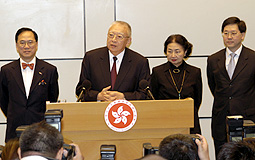
|
| Moving forward: The standing committee's endorsement of the Chief Executive's report has activated the amendment mechanism for constitutional reform in the Basic Law, Tung Chee Hwa (at podium) told reporters. Constitutional Task Force members - Chief Secretary Donald Tsang (left), Secretary for Justice Elsie Leung and Secretary for Constitutional Affairs Stephen Lam - joined him at the press conference. |
Chief Executive Tung Chee Hwa says the Government welcomes the National People's Congress Standing Committee's endorsement of his report on constitutional development.
"As Wu Banguo, NPCSC chairman said, the decision today was significant. They have had regard to views of various sectors and a decision was taken in support of the policy of 'one country, two systems' and also the provisions in the Basic Law. It was intended to maintain long-term prosperity and stability in Hong Kong, and it was in line with orderly progress and actual situation in HK," he said.
Mr Tung added that the decision has activated the amendment mechanism in the Basic Law. "It is time to take the constitutional development forward. I have instructed the Chief Secretary for Administration and his task force to submit their third report in May and also to promote the next stage of work in a rational, pragmatic and far-sighted manner."
He also urged various quarters of the community to be "calm and rational, and set aside your differences and disputes and preconceived notions and strive to build a consensus on the constitutional development in Hong Kong."
CS urges public to be 'results-oriented'
Chief Secretary for Administration Donald Tsang, who heads up the Constitutional Development Task Force, also met the media, flanked by the two other task force members, Secretary for Justice Elsie Leung and Secretary for Constitutional Affairs Stephen Lam.
"I'm sure the public will be results-oriented," Mr Tsang said. "We'll make sure constitutional development is gradual and orderly. That will be much better than taking unnecessary risks."
The first two reports from the task force focused on legislative process issues and principles in the Basic Law. In the next report, Mr Tsang said, "We will summarise the NPCs' views, and the recent decision. We will set out things that can be amended. These will be spelled out in the report. We hope to gather your opinions."
He appealed to people to submit their views on constitutional development, but to keep in mind the limitations set out in the Basic Law and in the standing committee's decision.
Consensus building key to reforms' success
"I believe that the community now has a golden opportunity to demonstrate our political maturity," he said. "I understand that there are a wide range of views on the subject in the community. But I must emphasise that, if we are to make good progress, individuals and organisations of different backgrounds, affiliations and views should come together, commence a dialogue on the basis of mutual respect, so as to better understand one another's concerns and worries, and not to waste time on confrontations, collisions, or arguments which go beyond the NPCSC's decision."
He added: "Only through rational discussions and consensus building can constitutional development achieve success. We must bear in mind that if any concrete proposals for constitutional development are to materialise, they must have the endorsement of a two-thirds majority of all Members of the Legislative Council and the consent of the Chief Executive, and they shall be reported to the NPCSC for approval or for the record. None of these steps is dispensable."
|